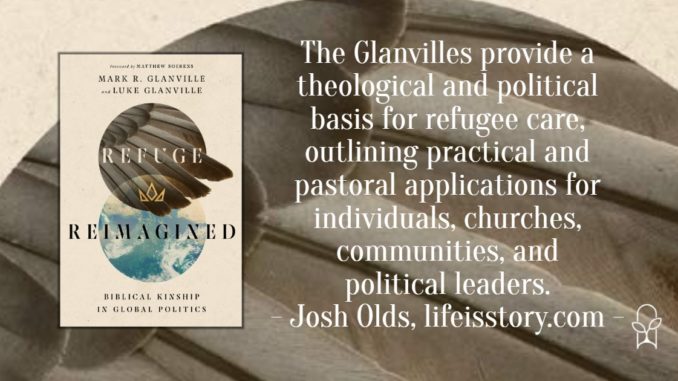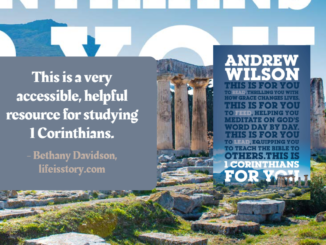
Published by IVP Academic on February 16, 2021
Buy on Amazon
Goodreads

The global crisis of forced displacement is growing every year. At the same time, Western Christians' sympathy toward refugees is increasingly overshadowed by concerns about personal and national security, economics, and culture. We urgently need a perspective that understands both Scripture and current political realities and that can be applied at the levels of the church, the nation, and the globe. In Refuge Reimagined, Mark R. Glanville and Luke Glanville offer a new approach to compassion for displaced people: a biblical ethic of kinship. God's people, they argue, are consistently called to extend kinship--a mutual responsibility and solidarity--to those who are marginalized and without a home. Drawing on their respective expertise in Old Testament studies and international relations, the two brothers engage a range of disciplines to demonstrate how this ethic is consistently conveyed throughout the Bible and can be practically embodied today. Glanville and Glanville apply the kinship ethic to issues such as the current mission of the church, national identity and sovereignty, and possibilities for a cooperative global response to the refugee crisis. Challenging the fear-based ethic that often motivates Christian approaches, they envision a more generous, creative, and hopeful way forward. Refuge Reimagined will equip students, activists, and anyone interested in refugee issues to understand the biblical model for communities and how it can transform our world.
I’m writing this review a few days after news reports surfaced of US Border Patrol on horseback, chasing down Haitian refugees at the southern border. With that backdrop, let me simply say that Refuge Reimagined is a necessary book. I am also writing this review just a few miles away from a US military base that has all but shut down its hospital temporarily to move medical staff to places where Afghan refugees have been evacuated. “The Refugee Crisis” is complex, multi-faceted and covers many different people groups, countries, and reasons for refuge. There is one thing that isn’t complicated, or at least shouldn’t be: Christians are called to care for those who need refuge. Unfortunately, even that simple statement has been lost in political complexities and expediencies.
Mark Glanville is an Old Testament scholar whose academic focus has been on immigration issues in the Old Testament, particularly Deuteronomic law on “adopting the stranger.” Luke Glanville is an expert in international relations and professor at Australian National University. It’s a dream team-up that makes Refuge Reimagined the perfect work for the brothers to collaborate on. The Glanvilles divide the book into four parts:
- The Bible – What does Scripture say about the treatment of refugees?
- The Church – How can the church live out kinship with refugee groups?
- The Nation – How should our national systems deal with refugees on the political level?
- The World – How can we develop a global kinship with refugees?
The first two parts, obviously, fall into Mark’s wheelhouse while the last two parts are within Luke’s expertise. The stepping-stone structure of the book is useful because, in my experience, the arguments I’ve heard from Christians against welcoming refugees starts at the biblical level but inevitably shifts toward the national/cultural level. There is a sense that even if Scripture told us to welcome the refugee, that doesn’t mean our nations have to. In this movement, Mark Glanville can thoroughly address the biblical argument then hand the baton off to Luke to finish the race.
The section on Scripture focuses, as one might expect, on Deuteronomy and the Law’s vision for the stranger (Heb. Ger). Glanville is comprehensive, yet accessible. He clearly and cogently breaks down these laws in their historio-cultural setting to make a solid case for welcoming the refugee. In particular, Glanville contrasts his exegesis with James K. Hoffmeier’s The Immigration Crisis. Hoffmeier, also an Old Testament scholar but with an academic emphasis on archaeology, is much more critical of welcoming immigrants. His work has been particularly influential as it was part of a prominent Bible study ran for members of Congress during the Trump Administration. Using Hoffmeier as a foil, Glanville is not only able to develop a robust defense of welcoming the refugee, he also dismantles the typical arguments and stances from Christians who take a more critical view.
Along the way, Glanville also provides an explosive explanation of the problematic Canaanite destruction texts, noting that the narrative has shown that Canaanites can be brought into the Israelite camp (e.g Rahab) and Israelites can be shown to be of Canaan at heart (e.g. Achan). Thus, Canaanite becomes a metaphor for unfaithful Israel and the destruction texts function as a mirror through which to see and understand the destruction of Israel. It’s a somewhat tangential point, but I wish Glanville had spent more time on it just for my own intellectual curiosity.
The second half of the book deals with international relations and political policy. A lot time is still on the theological side, contrasting the Trump Administration’s interpretation of Romans 13 with a, well, a more accurate interpretation. Glanville writes that we are to be neighbor-loving nations. He also gives a quick overview of the major reasons for migration and why refugees issues are so important in this day and age. The result is a political theology that urges nation-states to care for vulnerable outsiders and welcome them as kin.
This is such a needed book. The Glanvilles provide a theological and political basis for refugee care, outlining practical and pastoral applications for individuals, churches, communities, and political leaders. They powerfully argue that caring for refugees is being morally, fiscally, and spiritually responsible. Whether personally or institutionally, we cannot ignore the plight of these in whom the image of God dwells. The Kingdom of God demands better.



